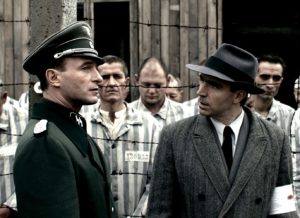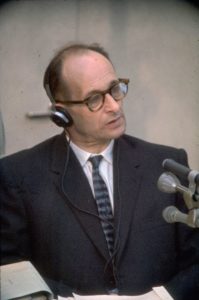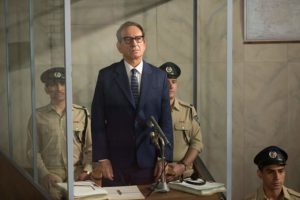Article: The Architect of Evil
 The recent Brazilian electoral process seems to have plunged much of the population into the utmost obscurantism, leading one to think that they have never studied History, nor are they aware that they are flirting with a dangerous authoritarian movement.
The recent Brazilian electoral process seems to have plunged much of the population into the utmost obscurantism, leading one to think that they have never studied History, nor are they aware that they are flirting with a dangerous authoritarian movement.
Of course, for many this is nothing but campaign bazophies, braggarts with no intention of being executed. But History shows that though monsters like Hitler are rare, there are countless followers who interpret and perform their wildest wishes and propositions. That is, they are ordinary people who commit monstrous acts.
 One of these characters was Otto Adolf Eichmann, an SS lieutenant colonel appointed to manage the logistics of Jewish mass deportations to the ghettos and extermination camps. He researched practical and effective ways to execute Jews, Gypsies, homosexuals and other “enemies of the German state”.
One of these characters was Otto Adolf Eichmann, an SS lieutenant colonel appointed to manage the logistics of Jewish mass deportations to the ghettos and extermination camps. He researched practical and effective ways to execute Jews, Gypsies, homosexuals and other “enemies of the German state”.
After testing firing squad and smothering prisoners with exhaust gases, Zyklon-B gas was adopted, and a mass extermination system was set up in countless camps like Dachau, Treblinka, Auschwitz-Birkenau and many others.
Eichmann was always very careful to avoid traces of his acts, which could incriminate him in the future. Like many other German officers, he left Germany after the end of the conflict using false documents, and took refuge in Argentina, a country that had remained neutral during the war.
 In 1960, Eichmann was located by Mossad, the Israeli secret service. In a daring operation, a group of agents kidnapped and drove him to Israel. There he was submitted to a troubled trial, which had worldwide repercussions. Sentenced to death, he was hanged on June 1, 1962.
In 1960, Eichmann was located by Mossad, the Israeli secret service. In a daring operation, a group of agents kidnapped and drove him to Israel. There he was submitted to a troubled trial, which had worldwide repercussions. Sentenced to death, he was hanged on June 1, 1962.
Many wonder about the prominence of Eichmann’s role, an officer of average patent. But in addition to his performance in the execution of the Holocaust, Eichmann was an extremely cold and calculating man who resisted to the end in admitting his guilt. His judgment, however, made it possible to give visibility to the horrors of the Holocaust, which nobody wanted to investigate, not even the Jews themselves. Something similar to the attitude we, brazilians, have regarding the excesses of our dictatorship age.
 There are three great films on the subject, and each brings a different approach. The most recent is “Operation Finale” (USA, 2018), where Ben Kingsley plays the German officer role. This film recounts the operation by Mossad to kidnap Eichmann in Argentina and take him to Israel. The story is romanticized with elements of action to make it more pleasing to the general public.
There are three great films on the subject, and each brings a different approach. The most recent is “Operation Finale” (USA, 2018), where Ben Kingsley plays the German officer role. This film recounts the operation by Mossad to kidnap Eichmann in Argentina and take him to Israel. The story is romanticized with elements of action to make it more pleasing to the general public.
 The second movie, “The Eichmann Show” (USA, 2015), shows the coverage of Eichmann’s trial in Israel. Subjected to immense pressure, both by the Jewish population, which did not understand why it needed a trial, as by the remaining Nazis, journalists Milton Fruchtman (Martin Freeman) and Leo Hurwitz (Anthony LaPaglia) cover the proceedings, which became the first judgment with worldwide disclosure. The film was enriched with real footage of both the trial and the death camps.
The second movie, “The Eichmann Show” (USA, 2015), shows the coverage of Eichmann’s trial in Israel. Subjected to immense pressure, both by the Jewish population, which did not understand why it needed a trial, as by the remaining Nazis, journalists Milton Fruchtman (Martin Freeman) and Leo Hurwitz (Anthony LaPaglia) cover the proceedings, which became the first judgment with worldwide disclosure. The film was enriched with real footage of both the trial and the death camps.
The third film, “Eichmann” (USA, 2007), shows the period between kidnapping and trial. From the viewpoint of police captain Avner Less (Troy Garit), the movie shows the interrogations conducted by the policeman with Eichmann (Thomas Krestschmann), investigating several stages of the German’s life and his numerous atrocities.
 With coolness and cynicism, Eichmann challenges Avner in a psychological game in which he seems to have absolute control. Under the tremendous pressure of Israeli and world public opinion, Avner is the only officer who has direct contact with Eichmann, and tries in every way to induce him to admit guilt for his crimes.
With coolness and cynicism, Eichmann challenges Avner in a psychological game in which he seems to have absolute control. Under the tremendous pressure of Israeli and world public opinion, Avner is the only officer who has direct contact with Eichmann, and tries in every way to induce him to admit guilt for his crimes.
These three movies allow a vision of a common man endowed with powers that led him to commit heinous acts, driven simply by the excuse of hierarchy and attending to the wishes of his supreme leader. Are not we seeing here in Brazil indications of similar attitudes, even before the definition of the elections?
 I recommend everyone to watch these three movies, to remind us of what the human being is capable of, especially with the banalization of evil, a phenomena perceived by the philosopher and writer Hannah Arendt, herself a survivor of concentration camps, and who acted as journalist on the cover of the Eichmann trial.
I recommend everyone to watch these three movies, to remind us of what the human being is capable of, especially with the banalization of evil, a phenomena perceived by the philosopher and writer Hannah Arendt, herself a survivor of concentration camps, and who acted as journalist on the cover of the Eichmann trial.






